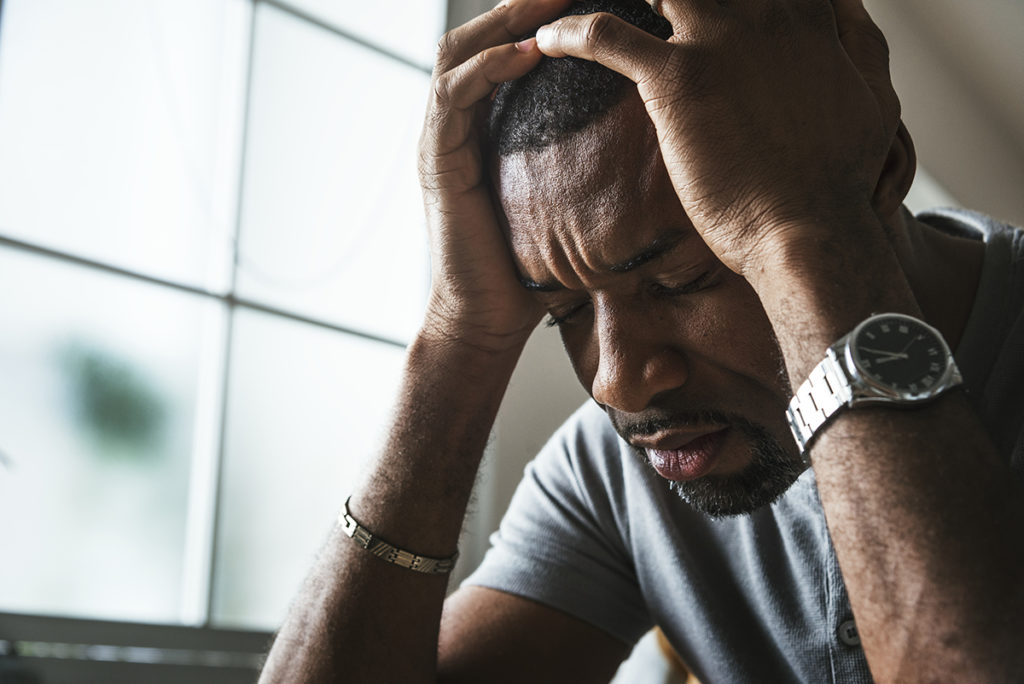Read the latest and greatest from our team
of incredible specialists.

Beach House Recovery Center » Blog » Substance-Induced Mood Disorders Explained
Many people view alcohol and drug use as a way to self-medicate, “take the edge off” or lift their spirits on a bad day. Unfortunately, these substances can make you feel worse and worse as the cycle of addiction begins to take over your life.
Often, people who develop a substance dependency don’t blame their moodiness on their drinking or drug use, because they tend to only associate those substances with positive emotions. What are substance-induced mood disorders, and how can you get help if you’ve developed a problematic relationship with drugs and alcohol?

A substance-induced mood disorder is a form of depression that results from overuse of alcohol or drugs. Unlike the hangovers or “crashes” people might experience after the effects of drugs and alcohol wear off, substance-induced mood disorders feel notably worse for much longer. Some people experience a near-total lack of interest or enjoyment in life.
When medical professionals identify substance-induced mood disorders, they first check to make sure their patients weren’t already living with diagnosable depression before they started abusing alcohol and drugs.
Because of alcohol’s role as a depressant, someone living with depression or anxiety or who regularly experiences insomnia or panic attacks might drink to help them relax, feel good about themselves and fall asleep more quickly. However, this coping mechanism often backfires because long-term alcohol abuse usually means developing a higher tolerance to its effects, thus resulting in the need to drink more to achieve the desired results.
While alcohol can provide short-lived relief from the symptoms of mental health problems, long-term use can make these disorders worse. Because of the way alcohol rewires the reward pathways in the brain, people who frequently drink to excess are likely to feel more anxious, sad or worthless the day after heavy drinking because their body’s levels of serotonin, a natural mood regulator, decrease sharply without alcohol in their system. Intoxication to the point of a blackout can also be a significant source of stress for people who can’t recall whether they did anything reckless or humiliating the night before.
Opioids: Because of the euphoric high they create, opioids are a frequent substance of use among people who self-medicate. Opioid dependencies often begin with a legitimate medical prescription, but because these drugs are so powerfully addictive, users can quickly become hooked. One significant risk of opioid use is how this class of drugs interacts with other substances such as alcohol, increasing users’ chance of an accidental overdose due to respiratory depression.
Marijuana: As laws regulating the possession and use of cannabis loosen in states around the country, this drug has become much more readily available. Many people view marijuana as a drug that helps them relax and ease the pain of various illnesses. Unfortunately, these effects are only temporary, and users feel worse when they eventually wear off.
Chronic users who smoke or vape marijuana are at a higher risk of developing lung diseases such as COPD. A growing body of research also suggests a connection between frequent pot use and psychosis. One 2019 study published in The Lancet Psychiatry shows daily use of marijuana, especially high-potency strains, increases the odds of having a psychotic episode.
Benzodiazepines: Benzodiazepines, also known as “benzos,” are a category of drugs prescribed to treat mental health issues like anxiety and insomnia. Many recognizable brand names, including Xanax, Valium and Klonopin, all fall under this class. Like opioids and cannabinoids, benzodiazepines flood the user’s body with dopamine – a neurotransmitter that causes a rush of pleasurable feelings. Even when people take benzos precisely as prescribed, they are still at risk of developing an addiction and experiencing dangerous withdrawal symptoms when they try to quit using.
Once a pattern of substance misuse takes hold, it can impact every other aspect of your life, until your cravings for drugs or alcohol are controlling everything you do. However, it is possible to undo years of self-destructive behavior and substance-induced mood disorders and set yourself on a new, positive path. The caring professionals at Beach House have made it their mission to help you attain the goal of lifelong sobriety. When you’re ready to learn more, our admissions counselors are standing by to take your call 24/7.
Whether you’re researching for yourself or a loved one, Beach House can help. We understand that this is a serious time in your life and that the treatment center you choose matters. We want you to feel comfortable and empowered to make the right decision for yourself, a friend, or a family member. This is why a counselor is waiting and available to answer your questions and help put your mind at ease regarding the next steps. Many of the staff at Beach House have walked in your shoes. If you feel you’re ready or want more information about how to help a loved one, we can help today. You can also learn why we are voted the #1 rehab for addiction treatment in Florida.
We accept most major insurance plans and can verify your benefits quickly and confidentially.
We’re committed to helping you access the care you need, our admissions counselors can guide you through your coverage options and available resources.





"*" indicates required fields